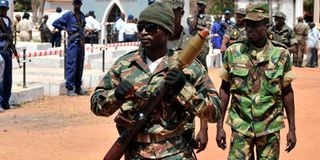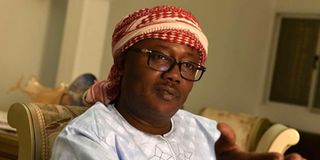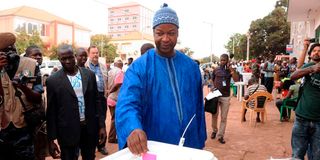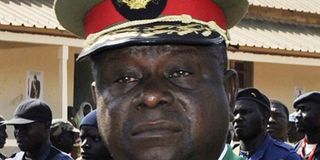Premium
Guinea Bissau coup attempt linked to drug trafficking

A soldier carries a rocket launcher during the state funeral of slain Guinea-Bissau president Joao Bernardo Vieira in a cemetery in Bissau on March 10, 2009. Sustained gunfire was heard on Tuesday near the seat of government in Bissau.
What you need to know:
- The military in Guinea-Bissau has been sanctioned in the past for aiding trafficking.
- In August, the US State Department announced a reward offer of up to $5 million for information that could lead to the arrest and or conviction of Guinea-Bissau national Antonio Indjai, a former head of the country’s armed forces.
- The president’s speech did not cite whether senior military chiefs had a role in the coup attempt, but he suggested the fight against drugs was causing jitters.
Officials in Guinea Bissau have linked the “failed” coup attempt on Monday to an escalation of the campaign against drug trafficking.
Moments after government forces retained control, President Umaro Sissoco Embaló said “isolated elements” opposed to government reshuffles and seeking control of trafficking channels may have tried to oust him.
He addressed the nation in a short statement before answering questions from journalists at the presidential offices by telling the population that “everything is under control”.

Umaro Sissoco Embaló, the President of Guinea-Bissau.
The events of Monday, he said, took place a week after a government reshuffle that was contested by the party led by the prime minister and three days after rumours flew that army Chief of Staff Biaguê Na N'Tan, who is in Spain for treatment, had died.
“Guinea-Bissau is in mourning, because brave children were killed today for the ambition of two or three people who think that this country has no right to live in peace,” he said, without providing details on the death toll.
“They are dead, but I don't know how many,” he said, adding that no government official had dead or been wounded.
“It’s not only the military who are involved in this action, but individuals who are under investigation for drug trafficking”, he stated, adding that the “attempted coup d'état” had to do with his fight against drug trafficking.

Nuno Gomes Nabiam casts his ballot to vote in the second round of the presidential election, on May 18, 2014 in Guinea Bissau.
Alongside Prime Minister Nuno Gomes Nabiam, deputy prime minister Soares Sambú, interior minister Botché Candé and defence minister, Sandji Fati, he added that an intense fire fight had ensued.
"It took five hours for the Armed Forces to rescue their supreme commander," he said, congratulating the defence and security forces that "managed to prevent this attack on democracy".
The link of the attempted coup to drug trafficking sets Guinea-Bissau apart from its neighbours Mali, Guinea and Burkina Faso, three countries where the army seized power recently, citing poor leadership by civilian governments in addressing insecurity.
Drug trafficking
The military in Guinea-Bissau has been sanctioned in the past for aiding trafficking. In August, the US State Department announced a reward offer of up to $5 million for information that could lead to the arrest and or conviction of Guinea-Bissau national Antonio Indjai, a former head of the country’s armed forces.

Guinea-Bissau's General Antonio Indjai, who has been dubbed the figurehead of a so-called "cocaine coup" in 2012. He lives in the shadows in defiance of a US bounty on his head.
The former general has been the subject of a United Nations travel ban since May 2012, “as a result of his participation in an April 2012 coup d’état in Guinea-Bissau,” according to a file published on him.
The president’s speech did not cite whether senior military chiefs had a role in the coup attempt, but he suggested the fight against drugs was causing jitters.
He added that he found it hard to believe that “we were going to get to this point or the children of Guinea would be in a position to promote yet another act of violence”.
“I would rather have them come to me and raise their problems,” said the president, recalling that “power is conquered at the polls”.
But he said that some individuals allegedly involved in the abortive coup had been detained.
He also appealed to the international community to continue supporting Guinea-Bissau.





